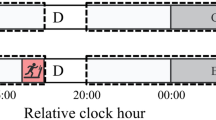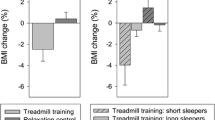Abstract
The purpose of this study was to investigate the effect of daytime intense resistance exercise for 2 consecutive days on sleep including changes in central nervous system function, autonomic function, and core body temperature on the following nights. Nine healthy male participants (23.4 ± 1.8 years of age) performed strenuous resistance exercise twice per day for 2 consecutive days. Resistance exercise in the morning included four lower body exercises. Squats and knee extensions consisted of five sets of 10 repetitions at a 10-repetition maximum (RM; approximately 75% of 1 RM), with a 1-min rest period between each set. Calf raises consisted of five sets of 30 repetitions at 10 RM. Resistance exercise in the afternoon included seven upper body exercises, each with four sets of 10 repetitions at a 10 RM. Polysomnographic, heart rate, and core body temperature measurements were performed during sleep for three days (baseline, Ex-1, and Ex-2). Of the polysomnographic parameters, there was a significant reduction in stage 2 sleep at Ex-2 (225.56 ± 18.78 min) compared to other nights. For heart rate variability, the high-frequency component at Ex-2 was significantly lower in the first cycle than in the third cycle in non-rapid eye movement sleep and rapid eye movement sleep. Intense resistance exercise for 2 consecutive days causes the inhibition of parasympathetic nervous system activity during sleep.




Similar content being viewed by others
References
Driver HS, Rogers GG, Mitchell D, Borrow SJ, Allen M, Luus HG, Shapiro CM. Prolonged endurance exercise and sleep disruption. Med Sci Sports Exerc. 1994;26(7):903–7.
Wong SN, Halaki M, Chow CM. The effects of moderate to vigorous aerobic exercise on the sleep need of sedentary young adults. J Sports Sci. 2013;31(4):381–6.
Passos GS, Poyares D, Santana MG, Garbuio SA, Tufik S, de Mello MT. Effect of acute physical exercise on patients with chronic primary insomnia. J Clin Sleep Med. 2010;6(3):270–5.
Myllymäki T, Kyröläinen H, Savolainen K, Hokka L, Jakonen R, Juuti T, Martinmäki K, Kaartinen J, Kinnunen ML, Rusko H. Effects of vigorous late-night exercise on sleep quality and cardiac autonomic activity. J Sleep Res. 2011;20:146–53.
Myllymäki T, Rusko H, Syväoja H, Juuti T, Kinnunen ML, Kyröläinen H. Effects of exercise intensity and duration on nocturnal heart rate variability and sleep quality. Eur J Appl Physiol. 2012;112:801–9.
Horne JA. Staff LHE. Exercise and sleep: body-heating effects. Sleep. 1983;6(1):36–46.
Dworak M, Wiater A, Alfer D, Stephan E, Hollmann W, Strüder HK. Increased slow wave sleep and reduced stage 2 sleep in children depending on exercise intensity. Sleep Med. 2008;9(3):266–72.
Flausino NH, Da Silva Prado JM, de Queiroz SS, Tufik S, de Mello MT. Physical exercise performed before bedtime improves the sleep pattern of healthy young good sleepers. Psychophysiology. 2012;49(2):186–92.
Oda S, Shirakawa K. Sleep onset is disrupted following pre-sleep exercise that causes large physiological excitement at bedtime. Eur J Appl Physiol. 2014;114(9):1789–99.
Meeusen R, Watson P, Hasegawa H, Roelands B, Piacentini MF. Central fatigue: the serotonin hypothesis and beyond. Sports Med. 2006;36(10):881–909.
Urhausen A, Kindermann W. Diagnosis of overtraining: what tools do we have? Sports Med. 2002;32(2):95–102.
de Faria AP, Cavagnolli DA, Rossi MV, Ferreira SE, Bittencourt LRA, Tufik S, de Mello MT. Effects of resistance exercise on the sleep patterns of sedentary individuals. Sleep Sci. 2009;2(3):141–6.
Rossi MV, Cavagnolli DA, Faria AP, Ferreira SE, Koyama RG, Neto AB, Lucchesi LM, Tufik S, de Mello MT. Acute effect of different types of physical exercise on sleep patterns. Sleep Sci. 2010;3(2):63–8.
Viana VA, Esteves AM, Boscolo RA, Grassmann V, Santana MG, Tufik S, de Mello MT. The effects of a session of resistance training on sleep patterns in the elderly. Eur J Appl Physiol. 2012;112(7):2403–8.
Gleeson M. Immune function in sport and exercise. J Appl Physiol. 2007;103(2):693–9.
Børsheim E, Bahr R. Effect of exercise intensity, duration and mode on post-exercise oxygen consumption. Sports Med. 2003;33(14):1037–60.
Uchida S, Shioda K, Morita Y, Kubota C, Ganeko M, Takeda N. Exercise effects on sleep physiology. Front Neurol. 2012;3:article 48.
Rechtschaffen A, Kales A. editors. A manual of standardized terminology, techniques, and scoring system for sleep stages of human subjects. Washington, DC: US Government Printing Office, US Public Health Service; 1968.
Uchida S, Feinberg I, March JD, Atsumi Y, Maloney T. A comparison of period amplitude analysis and FFT power spectral analysis of all-night human sleep EEG. Physiol Behav. 1999;67(1):121–31.
Moak JP, Goldstein DS, Eldadah BA, Saleem A, Holmes C, Pechnik S, Sharabi Y. Supine low-frequency power of heart rate variability reflects baroflex function, not cardiac sympathetic innervation. Heart Rhythm. 2007;4(12):1523–9.
Niemelä TH, Kiviniemi AM, Hautala AJ, Salmi JA, Linnamo V, Tulppo MP. Recovery pattern of baroreflex sensitivity after exercise. Med Sci Sports Exerc. 2008;40(5):864–70.
O’Connor PJ, Breus MJ, Youngstedt SD. Exercise-induced increase in core temperature does not disrupt a behavioral measure of sleep. Physiol Behav. 1998;64(3):213–7.
Youngstedt SD, Kripke DF, Elliott JA. Is sleep disturbed by vigorous late-night exercise? Med Sci Sports Exerc. 1999;31(6):864–9.
Shioda K, Ogawa K, Asaoka S, Mitsuyama T, Yoshikawa K, Uchida S. Effects of an early evening 10-km run on nocturnal sleep homeostatically degraded by an afternoon nap. Sport Sci Res. 2011;8:262–71.
Acknowledgements
This work was supported in part by the Global COE Program ‘Sport Sciences for the Promotion of Active Life’ from the Ministry of Education, Culture, Sports, Science, and Technology (MEXT) in Japan.
Author information
Authors and Affiliations
Corresponding author
Ethics declarations
Ethical approval
The Ethics Committee of Waseda University approved this research (approval number: 2009-079).
Conflict of interest
No conflicts of interest declared.
Rights and permissions
About this article
Cite this article
Shioda, K., Goto, K. & Uchida, S. The effect of 2 consecutive days of intense resistance exercise on sleep in untrained adults. Sleep Biol. Rhythms 17, 27–35 (2019). https://doi.org/10.1007/s41105-018-0180-8
Received:
Accepted:
Published:
Issue Date:
DOI: https://doi.org/10.1007/s41105-018-0180-8




